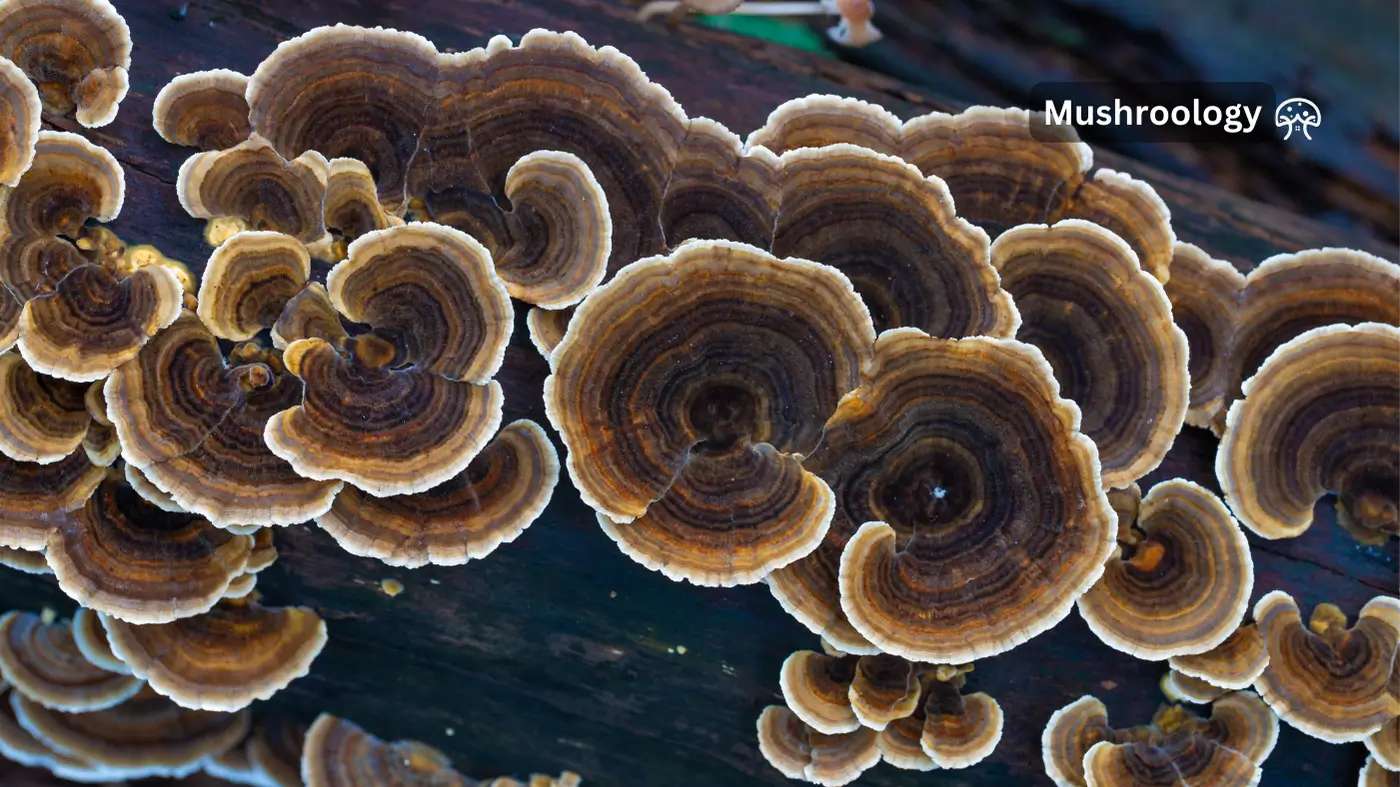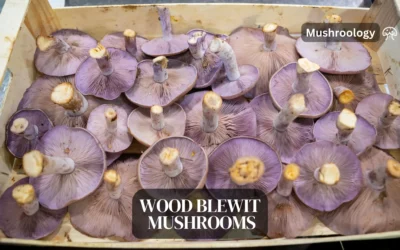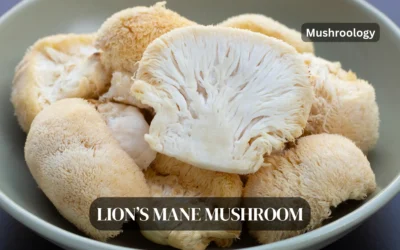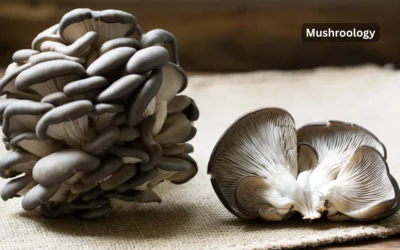Turkey tail mushrooms (Trametes versicolor) are renowned for their numerous health benefits, particularly in supporting the immune system, providing antioxidant properties, promoting gut health, and offering potential cancer support.
Immune System Support
Turkey tail mushrooms are well-known for their ability to enhance immune function. They contain polysaccharopeptides (PSP) and polysaccharide-K (PSK), which are key compounds in boosting the immune system.
- Polysaccharopeptides (PSP): PSP has been shown to stimulate the production of immune cells, including T-cells and natural killer (NK) cells, which are crucial for fighting infections and diseases.
- Polysaccharide-K (PSK): PSK, also known as krestin, is widely used in Japan as an adjunct therapy for cancer patients. It enhances the immune response by promoting the growth of white blood cells and improving the body’s ability to combat infections.
Studies have demonstrated that these compounds can modulate the immune system, helping to fight infections, illnesses, and diseases. For example, research has shown that turkey tail extract can increase the activity of CD8+ T cells and CD19+ B cells, which are essential for a robust immune response.
Antioxidant Properties
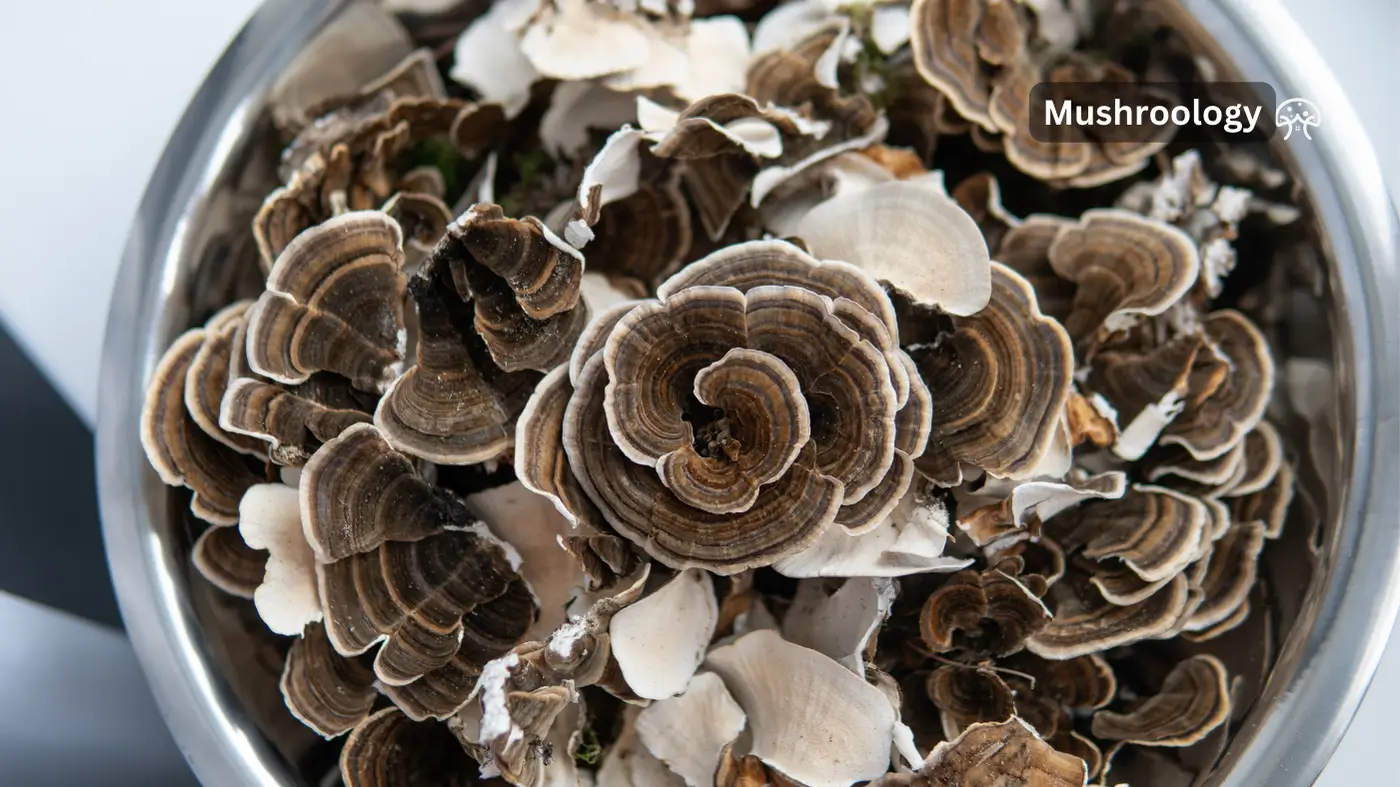
Turkey tail mushrooms are rich in antioxidants, which play a vital role in protecting the body from oxidative stress and free radical damage. Antioxidants are crucial for maintaining overall health and preventing chronic diseases.
- Phenols and Flavonoids: Turkey tail mushrooms contain a variety of phenolic compounds and flavonoids, such as quercetin and baicalein, which help reduce inflammation and stimulate the release of protective compounds.
- Beta-Glucans: These polysaccharides are known for their immune-modulating effects and contribute to the antioxidant properties of turkey tail mushrooms.
Research indicates that the antioxidant properties of turkey tail mushrooms can help protect DNA from free radical damage and reduce the risk of developing health conditions such as certain cancers and heart disease.
Gut Health
Turkey tail mushrooms are a valuable source of prebiotics, which promote the growth of beneficial gut bacteria. A healthy gut microbiome is essential for digestion, nutrient absorption, and overall well-being.
- Prebiotic Activity: The polysaccharides in turkey tail mushrooms act as prebiotics, supporting the growth of good bacteria like acidophilus and bifidobacterium in the gut microbiome.
- Gut Microbiome Balance: Studies have shown that turkey tail mushroom extract can improve the ratio of good bacteria to bad bacteria in the gut, enhancing gut health and immune function.
A balanced gut microbiome is linked to better digestion, a robust immune system, and a reduced risk of gastrointestinal problems. Turkey tail mushrooms help maintain this balance by providing the necessary nutrients for beneficial bacteria to thrive.
Cancer Support
Research has shown that turkey tail mushrooms may offer potential benefits for cancer patients. PSK, a compound found in turkey tail mushrooms, has been used as an adjunct therapy in cancer treatment in Japan.
- Adjunct Therapy: PSK is used alongside conventional cancer treatments to enhance the immune response and improve the effectiveness of chemotherapy and radiation therapy.
- Anti-Tumor Properties: Studies have indicated that PSK can help prevent lymph node metastasis, improve survival outcomes, and reduce the toxicity of chemotherapy.
For example, research has demonstrated that turkey tail mushroom extract can improve the antitumor immune ability by modulating immune systems and preventing the spread of cancer cells. Additionally, PSK has been shown to increase the expression of cytokines and chemokines, which are crucial for immune function and tumor suppression.
Can turkey tail mushrooms cause allergic reactions?
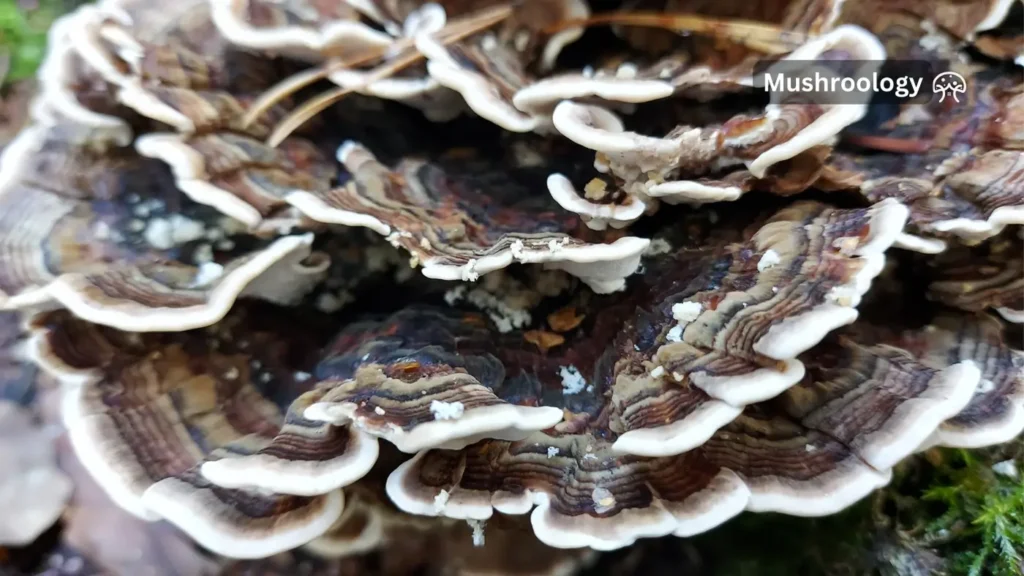
While turkey tail mushrooms offer numerous health benefits, they can cause allergic reactions in some individuals, particularly those with existing mushroom or mold allergies. It is essential to be aware of these potential side effects and take appropriate precautions, including consulting with a healthcare provider before use.
Potential Allergic Reactions
General Allergic Reactions:
Allergic reactions to turkey tail mushrooms can range from mild to severe and may include itching, swelling, hives, rashes, and wheezing.
In more severe cases, individuals may experience difficulty breathing, throat swelling, or anaphylaxis, which requires immediate medical attention.
Specific Cases and Reports:
Mushroom or Mold Allergy: People who are allergic to mushrooms or mold are more likely to experience adverse reactions to turkey tail mushrooms. These reactions can include trouble breathing, throat swelling, or skin rashes.
Recommendations and Precautions
It is recommended that individuals consult with their healthcare provider before consuming turkey tail mushrooms, especially if they have a known allergy to mushrooms or mold.
If any allergic symptoms occur after consuming turkey tail mushrooms, it is crucial to stop taking the supplement immediately and seek medical advice.
Those with a history of allergies to mushrooms or mold should avoid turkey tail mushrooms to prevent potential allergic reactions.
Are There Any Known Interactions Between Turkey Tail Mushrooms and Medications?
While turkey tail mushrooms offer numerous health benefits, they can interact with certain medications, including chemotherapy drugs, immunosuppressants, blood thinners, and diabetes medications. It is essential to consult with a healthcare provider before incorporating turkey tail mushrooms into your diet or supplement regimen to avoid potential adverse interactions.
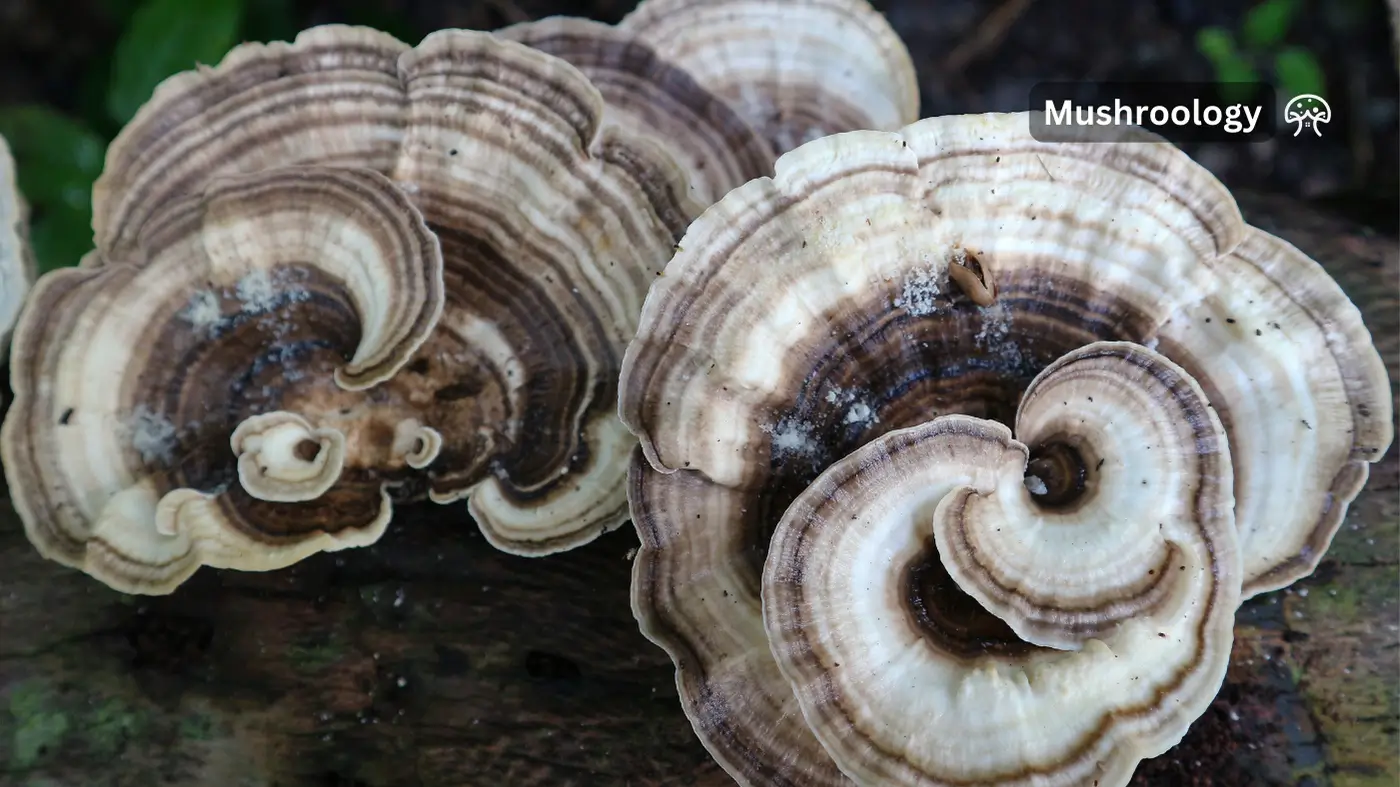
1. Chemotherapy Drugs
Interaction with Chemotherapy: Compounds found in turkey tail mushrooms, such as polysaccharopeptide (PSP) and polysaccharide-K (PSK), can interact with chemotherapy drugs. These interactions may alter the efficacy of the chemotherapy and increase the risk of side effects. For example, PSK has been shown to interact with drugs like cyclophosphamide and tamoxifen, potentially affecting how these drugs are processed and purged from the body.
Clinical studies have demonstrated that over half of the patients undergoing chemotherapy took herbal products, including turkey tail mushrooms, which could lead to clinically significant interactions.
2. Immunosuppressants
Turkey tail mushrooms are known for their immune-boosting properties. This can potentially interfere with the effects of immunosuppressant medications used for autoimmune diseases, organ transplants, or cancer. The stimulation of the immune system by turkey tail mushrooms may counteract the intended effects of immunosuppressants.
3. Blood Thinners
Turkey tail mushrooms may have blood-thinning properties, which can increase the risk of bleeding in individuals taking anticoagulant or antiplatelet medications, such as warfarin. This interaction can lead to an increased risk of bleeding complications.
4. Diabetes Medications
Turkey tail mushrooms may lower blood sugar levels, which can interact with diabetes medications. This interaction could cause blood sugar levels to drop too low, leading to hypoglycemia. It is important for individuals taking diabetes medications to monitor their blood sugar levels closely when consuming turkey tail mushrooms.
Recommendations and Precautions
It is crucial to consult with a healthcare provider before adding turkey tail mushrooms to your regimen, especially if you are taking any of the aforementioned medications. Your healthcare provider can help monitor for potential interactions and adjust medication dosages as needed.
If you experience any unusual symptoms or side effects after consuming turkey tail mushrooms, contact your healthcare provider immediately.
Turkey tail mushrooms are not recommended for use during pregnancy or lactation due to a lack of safety data.

